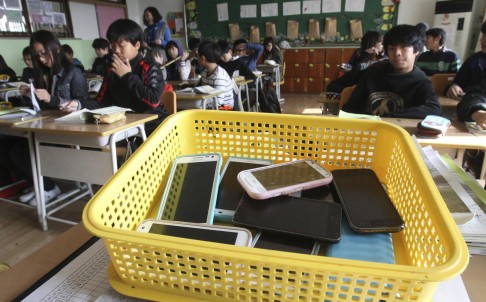S Korea develops smartphone app to curb student suicide
PUBLISHED : Sunday, 15 March, 2015, 3:36am
UPDATED : Sunday, 15 March, 2015, 3:36am
Agence France-Presse in Seoul

Smartphones from students in Suwon, South Korea. Photo: AP
South Korea has developed smartphone apps to help bring down its high student suicide rate by warning parents when their children might be at risk, the education ministry said.
The government-developed apps, which the ministry hopes to introduce immediately, are programmed to detect "suicide-related" words used by children on social networks or in messages or internet searches on their phones.
This would then trigger an alert, which would be sent to the parents on their smartphones. Although their use is not mandatory, the ministry hopes the apps will be installed by a large number of parents as an extra precaution against school-related stress for children. "Student suicide has become a social problem requiring systematic and comprehensive steps to prevent it," the ministry said.
South Korea's suicide rate ranks among the highest of the 34 member nations of the Organisation for Economic Cooperation and Development.
Student suicides are a particular problem, peaking every year around the time of the hyper-competitive national college entrance exam.
Education ministry data shows that 878 students took their own lives between 2009 and 2014, including 118 last year.
The most commonly cited cause in school-age suicides was problems at home, followed by depression, grades and career concerns.
Just over half of South Koreans aged 14 to 19 confessed to having suicidal thoughts, according to a survey conducted last year by the state-financed Korea Health Promotion Foundation.
More than 40 per cent of those respondents said school pressure and future uncertainty concerned them the most.
The survey found South Korean teens often lack access to professional help or are reluctant to seek it out, with almost half turning to friends instead of teachers, counsellors or parents.
The education ministry said its apps would provide a way of monitoring those interactions with friends for any danger signs.
"The apps were only approved [on Friday] at a meeting of related cabinet members, but we hope their installation will spread quickly among schools, students and parents nationwide," a ministry official said.
Smartphone penetration in South Korea is one of the world's highest with nearly 85 per cent of households having a device.
Teachers gave a wary reception to the new initiative, saying more effort should be focused on the causes of suicidal tendencies among students, rather then detecting symptoms.
"Instead of a stop-gap policy, we must work out a fundamental and eventual solution, because various factors lead to the suicide of students," the conservative Korean Federation of Teachers' Associations said.
The more liberal Korean Teachers and Education Workers Union said the apps raised privacy issues and failed to address systemic problems.
"Any direct monitoring of social networks and messaging services raises possible cause for concern," the union said in a statement, adding that the high-stress exam system also needed reviewing.
Success in the college entrance exam means a secured place in one of South Korea's elite universities - a key to future careers as well as marriage prospects - and parental pressure can be fierce. According to the education ministry, South Korean parents spent 19 trillion won (HK$130 billion) on extra tuition for their children in 2013.
The day of the exam - held simultaneously in 1,257 centres nationwide - sees the entire country switch to silent mode.
